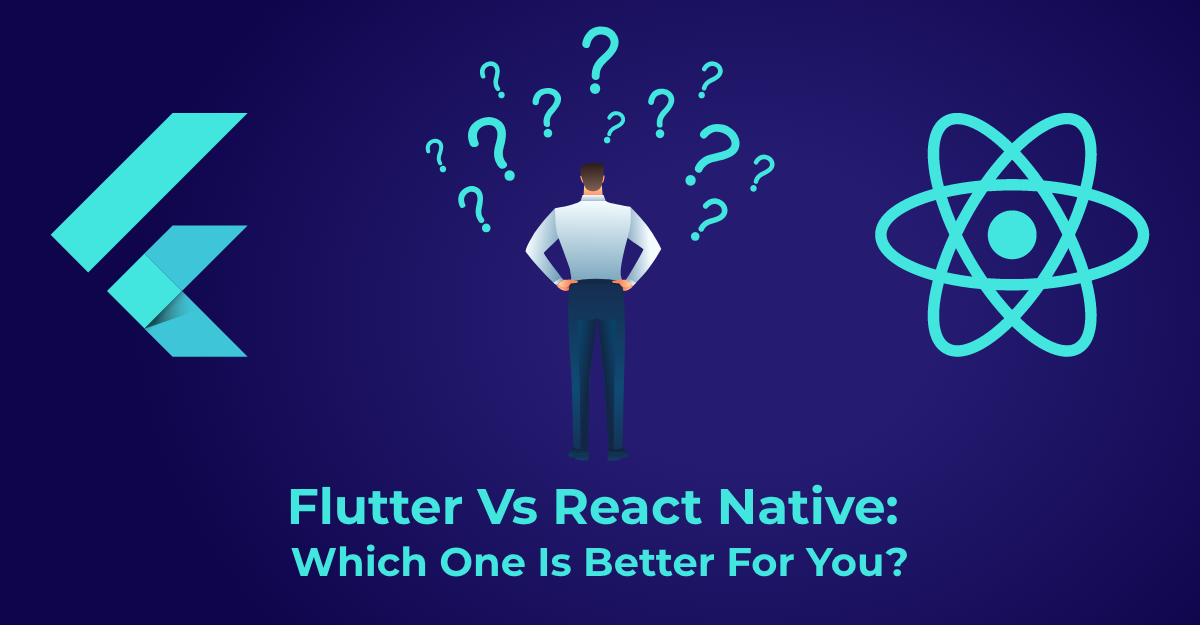Did you know that mobile devices account for over 52% of all web traffic? In 2020, mobile applications had the most substantial effect on your company's performance. So now you know what you're losing out on if you don't have a mobile app for your company.
Cross-platform mobile app development has recently become the main topic of conversation since more and more firms want to release their apps faster and reach a larger audience. It's no surprise that the industry for mixed app development is flooded with several software development kits (SDKs), platforms, and software programs.
In this post, we'll compare and contrast two cross-platform mobile app development frameworks that have exploded in popularity. Flutter VS React Native.
Flutter vs. React Native: Market share in 2020
While React Native is the most frequently used mobile framework, Flutter app development services have slowly grown exponentially and devotion since 2017. It is one of React's key opponents in 2020, and it is expected to expand in the future.
- Flutter's overall sales grew by 28% to £5.2 billion ($7.2 billion) in the year ended December 31, 2020, thanks in part to its merger with The Stars Group.
- Due to its sophisticated capabilities and ability to delve into native ones on each platform, React Native has become the most well-known brand for creating complex hybrid apps that give a natural user experience.
- According to a poll, RN is ranked 6th, with 11.5% of all respondents voting for it.
- Only professional ones are considered and React Native comes in fifth with 11.8%.
What is Hybrid App development and why choose it?
A hybrid app is a software programme that incorporates features from both native and online apps. Web applications that have been wrapped in a native software shell are known as hybrid apps. The shell can link to whichever features the mobile platform gives using a website integrated into the app once it's deployed directly from an app store.
Hybrid applications are easy to use and intuitive for developers to create only one piece of code for a mobile app while yet supporting various platforms. Hybrid apps may function somewhat slower than native or web variants of the same programme since they add another layer between the source code and the targeted device.
Features of hybrid apps include:
- The capacity to work regardless of whether the gadget is connected or not.
- Connectivity with the operating system on the mobile app.
- Web-based applications interface.
- An integrated browser that allows you to view dynamic internet information more easily.
Reasons to opt for hybrid mobile app development:
According to a 2017 study conducted by the Ionic Developer, 32.7 percent of almost 13,000 developers have completely erased native app development in favour of the hybrid method.
- A hybrid mobile application is a native web application that has been encased around a native app.
- Web techniques such as Javascript, HTML 5, and CSS3 are used in hybrid applications of flutter app development services. It may also make use of features found on native systems.
- Hybrid mobile applications, on the other hand, may access GPS, camera, contacts, and other data and can operate on both Android and iOS platforms.
Flutter App development
Flutter is a free, open-source mobile UI toolkit built on Google's Dart programming language, which was introduced in 2017 and launched in 2018, featuring design-specific widgets, a completely customizable environment, and a stateful hot reload capability for quicker development.
Flutter began as a free software mobile UI framework aimed at competing with Facebook's React Native. It has now grown into a complex framework that allows developers to create native interfaces for not just online and mobile apps but also pc and integrated programmes.
Your app will look fantastic and closely resemble the platform-specific native experience owing to Flutter's unique features.
Flutter app development company in Indiahas your side regardless of where you want to launch your apps - on phones, computers, tablets, TVs, and smart displays.
React Native App development
React Native is a JavaScript-based framework created by Facebook in 2015 that allows developers to create native apps for iOS and Android sans sacrificing the customer experience. It builds native UIs with a single source accessible across numerous channels using parts. It is similar to widgets in Flutter.
React Native makes use of JavaScript, the most widely used web development language. React Native allows programmers to combine the power of React with the varied capabilities of each system, allowing them to integrate the required features effortlessly.
Developers may also utilise this technology to design user interfaces that seem like they belong on each platform.
Flutter vs React Native: A comparison
In summary, these are the differences identified between the two prominent cross-platform technologies, Flutter and React Native:
- Does flutter outperform react native in performance?
Flutter does not require the JavaScript bridge to communicate with a native application, unlike React Native. As a result, Flutter with widgets is theoretically quicker. Flutter is also driven by Dart, which comes with its own package management called Pub and a separate SDK that comes with the Dart VM.
- Is it simpler to use javascript than dart?
JavaScript has been there for a longer time and is well-known among developers. Dart, on the other hand, has existed since 2011 (internally at Google). However, it is still relatively new to most programmers outside of Google.
JavaScript is a robust and reliable programming language that is simple to use. In Dart, which has a Java-like writing style and grammar, developers are still having difficulty finding answers to specific challenges. Developers with OOPS experience, on the other hand, can quickly understand and use Dart after they've learned the basics.
- Which is more popular among developers?
When it comes to Flutter vs. React Native, React Native was released in 2015, whereas Flutter was released in 2018. As a result, it has a larger community and user base. Flutter, on the other hand, has grown tremendously in a short period. Flutter, on the other hand, is backed by Google. The flutter app development company in India is likely to catch up to React Native shortly.
- Which has better performance?
When comparing the speed of Flutter vs. React Native, Flutter is unquestionably quicker in terms of development. A large number of competent developers follow RN. The C++ engine, on the other hand, aids in the faultless support of the language in Flutter. Flutter may also lead to smooth and quick apps owing to FPS animations requirements and the Skia graphics package that goes with it.
- Native appearance
Flutter does not require any extra APIs to function. Unlike React Native, flutter app development services take care of everything necessary to connect the device and the software. React Native uses Objective-C and the Java API to convert to native code. It not only shows native components on iOS and Android, but it also gives you direct access to local capabilities.
Other Hybrid app frameworks
Mobile's worldwide market share was estimated to be $ 154.05 in 2019, and it was predicted to expand at a rate of 11.5% annually from 2020 to 2027. Businesses, regardless of their industry, seek to increase market share by using compelling mobile apps. They have discovered that it is the most engaging tool for engaging people 24 hours a day, seven days a week via portable devices.
Every hybrid app is built on a code foundation, which reduces the time it takes to build and deploy a product.
Let's have a look at some other hybrid app development frameworks for the year 2021.
1) PhoneGap
- It's an Apache License 2.0 accessible hybrid app development platform.
- The most recent version, 10.0.0, was published on August 4, 2020.
- It's compatible with a variety of platforms, including Android, iOS, and Electron.
- HTML 5, CSS, JavaScript, Java, C++, Objective-C, and C# are examples of programming languages.
2) Ionic
- It remains an open application for developing hybrid apps.
- Max Lynch, Ben Sperry, and Adam Bradley founded it on February 4th, 2021.
- The most recent version was released on February 4, 2021.
- AngularJS and Apache Cordova are used to create it.
- It's under the MIT licence.
Cost of Flutter and React Native app development
- Flutter
When trying to hire flutter app development services at a lower cost to construct a Flutter app, exporting or even outsourcing is a viable option. The following are the hourly prices for Flutter developers by region:
| Regions | Hourly Rate $ |
| The USA and North America | $ 74-200 |
| Western Europe | $ 60-150 |
| Ukraine and Eastern Europe | $ 30-50 |
| Brazil and South America | $ 40-60 |
| India | $ 40 |
- React Native
| Regions | Hourly Rate $ |
| North America | $100-150 |
| Russia | $25-45 |
| Asia | $ 18-40 |
| South America | $ 30-50 |
| Australia and Europe | $ 60-95 |
Both Flutter and React Native are fantastic frameworks for creating cross-platform apps that are faster and more efficient to develop than most native tools.
However, Flutter provides a wide range of customizable widgets for both Android and iOS. It eliminates the need to devote significant time and effort to customizing individual UI components in your programme. As it is converted to core features, Flutter also runs better and quicker.



